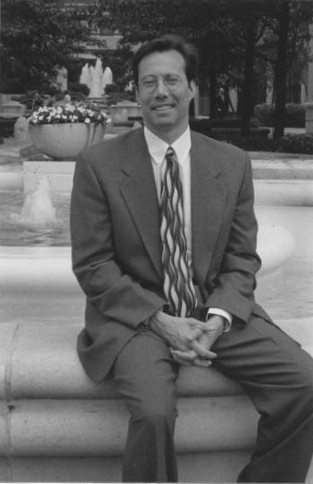Difference between revisions of "Jay Fisette"
Rlschlittler (talk | contribs) |
|||
| Line 1: | Line 1: | ||
| − | [[Image:OEFisette.jpg|center|frame|Jay Fisette, County Board, Arlington, Virginia. Photo by Ron Schlittler.]] | + | [[Image:OEFisette.jpg|center|frame|Jay Fisette (D), County Board, Arlington, Virginia. Photo by Ron Schlittler.]] |
| Line 5: | Line 5: | ||
<tr> | <tr> | ||
<td style="width: 50%; background-color: #E8E8E8; padding: 1em;"> | <td style="width: 50%; background-color: #E8E8E8; padding: 1em;"> | ||
| − | '''Jay Fisette | + | '''Jay Fisette (D)''' |
Born February 25, 1956 | Born February 25, 1956 | ||
Revision as of 17:49, 4 June 2008
|
Jay Fisette (D) Born February 25, 1956 Arlington County Board Member Arlington, Virginia 186,000 constituents |
Career Overview Elected November 1997 Re-elected 2001, 2004, 2007
|
Prior to being elected, Jay Fisette served as the executive director of the Whitman-Walker Clinic, Inc., an HIV/AIDS medical and social services facility in Washington, D.C.
Essay by Jay Fisette for Out and Elected in the USA
Don’t ever run for office because you are gay or lesbian. But, don’t ever let being gay or lesbian stop you from fulfilling any dream you have – including the desire for elected office. -Jay Fisette
I studied political science and always gravitated toward public policy and community building. I learned that government was a force for good, and public service was a noble profession. Then I discovered, or uncovered, my true sexual orientation. The clarifying moment was upon my arrival in San Francisco at age 23. After many years of denial, avoidance, angst and pain, these 18 months grounded my confidence in my true identity as a gay man. It was here, in the recent aftermath of Harvey Milk’s death that I started to recognize the importance of having openly gay men and lesbians in elected office.
After finishing my graduate work at the University of Pittsburgh, I moved to the Washington D.C. area in search of a home, a job, and a boyfriend. Ultimately, I found all three. Arlington, Virginia, minutes from downtown D.C., offered all the conveniences of a suburb with full access to the city at a lower cost and with an enviable quality of life. After we bought a house, my interests took a marked shift from international to local issues. As I became increasingly familiar with the Arlington community, my interest in running for office surfaced again – and it seemed feasible.
Arlington is an educated and diverse community with a proud progressive tradition dating back to the times of segregation. Those who associate Arlington with the generally conservative social policies of the Commonwealth of Virginia have gotten it wrong.
I became involved with the Arlington Gay and Lesbian Alliance in the late ‘80s as we successfully advocated for the inclusion of sexual orientation protections in the existing human rights ordinance. In recent years Arlington has become the only jurisdiction in Virginia to provide domestic partner benefits to county employees.
I ran for a vacant County Board seat in a 1993 special election. My candidacy and primary victory surprised nearly everyone, yet I lost the general election with 49.4% of the votes. I ran again in 1997 and won 62% of the votes.
My experience of coming out as a gay man has enriched my life and surely contributed to the development of my core values, such as an appreciation for the underdog and a commitment to the separation of church and state, privacy rights, diversity, individual dignity and compassion. These are the values I must call on every day.
A full 80 percent of my work focuses on budget or land use issues. Few specifically gay and lesbian issues come before the County Board. As Barney Frank once told me, the greatest contribution is in doing my job and doing it well each day. Though I was able to craft and pass a hate crimes resolution immediately after Matthew Shepard’s death and can ensure representation on advisory boards and commissions, most of my impact is more indirect.
In order to create a world without prejudice, with equal opportunity, and in which gay and lesbian youth choose to live and become healthy, productive members of our society, people must come out – must be honest. The “Don’t Ask, Don’t Tell” policy does not suffice. The words of Andre Gide remain an inspiration to me as he once said; “It is better to be hated for what one is, than loved for what one is not.”
Return to Out and Elected in the USA index • Go to next article
